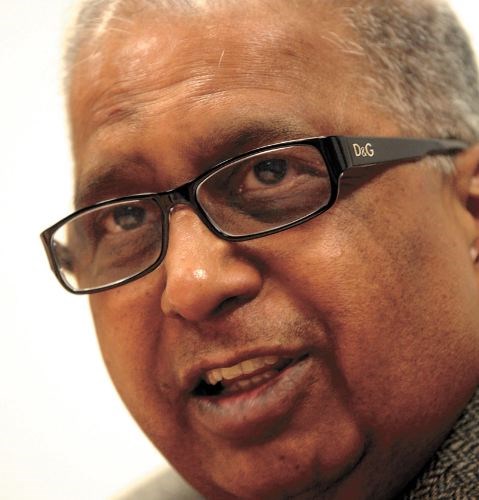Dr. Suresh Katakkar doesn't hold any hard feelings against the B.C. Cancer Agency after his former employer suspended him and launched an investigation into his practice.
Katakkar resigned as the chief medical oncologist at the B.C. Cancer Agency Centre for the North in early June after being suspended in late May for violating the agency's treatment protocols.
"I have nothing against them," Katakkar said Thursday during a visit to Prince George. "As an organization they have rules and regulations and yes, I have violated the rules and regulations, I don't deny that. I did it for the sake of the patient."
The patient was Holly Hill, the 33-year-old daughter of former Prince George-Peace River MP Jay Hill. She had an aggressive form of cancer so Katakkar said he lobbied on her behalf to get certain drugs outside of the normal protocol approved, but when his pleas were denied by the agency, he went another route, obtaining powerful chemotherapy drugs and creating a vaccine out of her own blood tissue.
"I have not done anything wrong, but they have the right to investigate," Katakkar said. "I have no problem with them investigating and checking."
Hill died of cancer in May and the investigation is ongoing.
A spokeswoman for the Provincial Health Services Authority said Thursday that 260 of Katakkar's patient files have already been reviewed, but that there are still about 500 to go. Last month B.C. Cancer Agency president and CEO Dr. Max Coppes said the biggest challenge with the investigation was trying to determine if there was anything not on the patient charts.
Katakkar said he hasn't been interviewed as part of the investigation and doesn't expect to be contacted by the agency until the probe is complete. However, he said that since the cancer agency has examined "a pretty good sample" of his charts he believes they should be able to determine if he ever put patients in danger -- Katakkar insists he never did.
The Hill case was an aberration, Katakkar maintains. He said he acted the way he did because the patient was so young.
"I stand by what I did," he said. "She was a young patient, I don't do those things routinely for every patient. As a young patient, she deserves to have every (treatment option) that's available, to give her even a month or two months more. I don't feel regret for what I did."
Katakkar said he believes the agency's protocols need to be tweaked to take into consideration the age of the patient. He believes younger patients should be given more treatment options, even if the financial cost is higher because of the length of time they could live should they survive the cancer.
After a decades-long career in the United States, Katakkar admitted it was an adjustment to understand the realities of the Canadian system.
"It's a different approach here, it's not a private medicine approach," he said. "It's an approach where there's a certain amount of money that's available for certain treatments. Certain treatments are routinely done here and certain treatments are not done, the cost is taken into consideration."
Katakkar is in Prince George to deal with housekeeping issues at his Prince George residence. He's currently living in Tucson, Ariz., and working as a locum.
Despite the circumstances surrounding his departure, Katakkar is calling on the community to rally around the new cancer centre and doesn't want his situation to become a distraction.
"We are getting a new cancer centre, we should support it," he said. "We should go all the way and hope for the best that they will get new physicians who will be patient-oriented."
The cancer agency is currently trying fill two vacant oncologist positions for the centre, which is set to officially open later this year.
Katakkar said he'd still be willing to work with the cancer agency and other local health professionals to provide free advice and suggestions for the new cancer centre.
One of the most difficult parts of his resignation was having to leave his patients in Prince George, Katakkar said. Due to the ongoing investigation he's been unable to talk to the people who used to be under his care, but he did write a letter to them, which was published in the Citizen in July.
Some of his former patients have spoken out publicly to defend Katakkar and explain why he meant so much to them.
"I really appreciated all the support that patients have given me, there is no question," he said. "Patients, medical staff, the doctors have all supported me and it's great to see that."
Katakkar was named a compassionate doctor last month by Patients' Choice based on online votes by patients south of the border. The organization hands out awards to the top three per cent of doctors based on the votes of nearly 100 million patients on three websites.
As for whether he'd be able to work again in Prince George after the formal investigation is complete, Katakkar acknowledged that it's unlikely. He doesn't expect that the cancer agency will offer him his old job back and even if they did, he said he would need assurances he would be free to practice medicine the way he feels it should be done.
"It would be extremely difficult for me to make that decision unless the cancer agency discusses everything very openly and freely with me," he said. "Until they make those changes -- not just promising me, I want changes made -- only then could I consider (coming back)."


